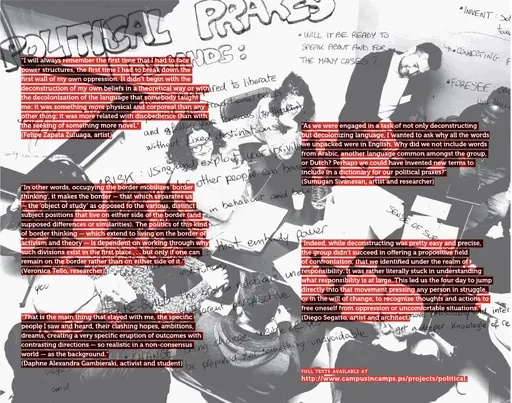
Author(s)
Isshaq Al-Barbary (Campus in Camps), Diego Segatto (Campus in Camps)
In April 2016, BAK, basis voor actuele kunst, brought to life the Here We Are Academy: a spirited temporary recomposition of a refugee-initiated platform for learning called We Are Here Academy.
Established in Amsterdam in 2012, We Are Here is the first large-scale organization of refugees living in limbo in the Netherlands. Through projects organized with artists and activists, the group explores the space of art as one wherein members can practice visibility, solidarity, self-representation, and action—structurally unavailable to them due to society’s denial of the right of refugees to have rights. If We Are Here Academy is where refugees can learn, Here We Are Academy is where they can teach (each other and those with citizen rights) the knowledge of survival.
Campus in Camps joined the Academy’s temporary “faculty” to co-develop its curriculum and gather with refugees, artists, students, researchers, and activists to continue our commitment to writing-by-embodying an ongoing Collective Dictionary. We have taken to heart curator Maria Hlavajova’s question of how to conceive of “future vocabularies” in times like ours; of how to think and practice a lexicon of “being together otherwise.” Such a lexicon could enable us to move about the current impasse, negotiating refugee participants’ knowledge against the reality of a contemporary western society that hides its own failings behind the label “refugee crisis.” It has been a complex, humbling, and at times conflict filled process of figuring out how to speak a language of neither victim nor victor, but that of confident political subject who recognizes and acts upon the urgencies of the contemporary. It has led us, if tentatively, to shape the contours of an entry for Political into the Collective Dictionary. Download the complete Collective Dictionary here.
Campus in Camps “Collective Dictionary: Political” was originally published in FORMER WEST: Art and the Contemporary After 1989, Maria Hlavajova and Simon Sheikh, eds. (Utrecht: BAK, basis voor actuele kunst and Cambridge, MA: MIT Press, 2016), pp. 567-568.